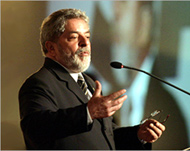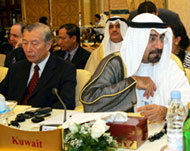G77 nations resent economic coercion
Officials from 133 countries have concluded the second Group of 77 conference after agreeing on a final statement that was big on noble intentions but small on concrete proposals.

Hosted in Qatar’s capital, Doha, delegates on Thursday vowed to push for free trade reform and United Nations restructuring.
Qatar’s permanent UN Ambassador Nasir Abd al-Aziz al-Nasir said the document also gave top priority to development-related issues, south-south cooperation and the combat of hunger and poverty.
There was slight criticism of the unilateral economic sanctions imposed by Washington on Cuba and Syria and the document urged the international community to eliminate coercive economic measures against developing countries.
But officials from some of the richest and poorest countries in the world who spoke to Aljazeera.net demonstrated considerable differences in just how to deal with the issues practically.
Tackling poverty
Malaysia’s Prime Minister Abdullah Badawi stressed poverty could be eradicated if developing nations focused their efforts on investing in poor countries, empowering them to exploit their own resources.
|
“We would not be able to export our products if these subsidies were not in place” Gaousou Toure, |
Guinea’s political and cultural affairs director, Gaousou Toure, insisted that countries such as his were dependent on subsidies to maintain their agriculture – a situation that would not change soon, no matter how much investment was made.
“We would not be able to export our products if these subsidies were not in place,” Toure said.
And Jamaica’s Foreign Minister, Delano Franklyn, – who is chairing the conference – added that poverty could be tackled if major trade blocs, such as the EU, were prepared to talk with developing nations about their economic plans.
Giving an example, Franklyn said Brussels had planned to slash the price of sugar – one of the mainstays of the Jamaican economy – without any discussion or negotiation.
“We only found out when the plan was leaked,” he said.
UN reform
And debate of the UN Security Council was equally diverse, from nations pushing to join and others proposing it be disbanded.
 |
|
Brazil hopes to gain a permanent |
Brazilian and Indian officials argued the case for their entry to the Security Council, but Pakistani Minister of Foreign Affairs Khurshed Kasuri argued for the opposite.
“If nations are supposed to be dealt with equally, why is the UN allowing the situation where we have second class states to continue?” he asked.
Malaysian Prime Minister Badawi said the only thing that was definite about Security Council reform was that it would be the top issue at the next UN General Assembly meeting.
“The UN should not be a forum for normal discussions only and everything else is pushed to the UN Security Council,” he added.
Zimbabwe President Robert Mugabe was vague on detail in his speech, only proposing that the council’s reform not be dominated by concern merely for geographical representation or population size.
“It must speak of the realities of our new world and show our determination to remain faithful to our people’s struggles for equity and social justice.”
Pay up
The final draft also urged rich countries to meet their obligations by raising official development assistance (ODA) to 0.7% of gross national product.
The target was set by the United Nations several years ago, but most industrialised countries are a long way from meeting it.
 |
|
China joined 132 members at the |
Dr Aouni Barhani – an executive adviser to the summit – told Aljazeera Holland was one of the few developed countries to have met its obligations.
He added that although Qatar was proposing the establishment of a new development fund, “most developing countries do not need new pledges, just what was previously promised. It is worth mentioning that the oil-rich Gulf has met its obligations”.
He also said that if all wealthy nations boosted their aid budgets to the UN target level, it would raise tens of billions of dollars in needed funds.
Effectiveness
Barhani concluded by saying it was inappropriate to ask what kind of concrete results the conference had achieved.
“This is all about creating a moral consensus rather than agreeing a list of policies. Let’s remember that the vast majority of the countries attending today were nearly all colonies just a few decades ago.
“A conference like this is just the place for growing and developing countries to talk about their issues, to create a moral agenda, in a forum that is not dominated by the rich and powerful,” he said.
The G77 was originally founded in 1964. Today it has 132 countries and includes a diverse range of nations, from the world’s poorest countries with the lowest life expectancy to rapid-growth economies with high per capita incomes.
China also took part in the Doha conference, though it is not a G77 member.